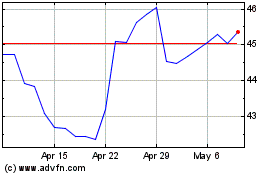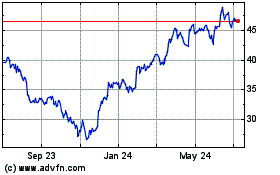By Ben Foldy
With the strike at General Motors Co. stretching into a second
month, the impact is intensifying across the Midwest economy,
hitting more businesses and auto-parts suppliers reliant on GM's
U.S. factories for work.
The United Auto Workers struck a tentative labor agreement with
GM last week, but union leaders decided Thursday to continue
picketing until workers approve the deal.
The move likely extends the nationwide walkout, already the
company's longest in decades, through Friday as UAW leaders turn
their attention to educating workers on the proposed contract terms
and as voting gets under way on whether to ratify the
agreement.
Meanwhile, the financial toll is mounting for both the company
and states -- like Michigan and Indiana -- where GM has a
concentration of unionized workers. Economists say the cascading
effect of lost wages, production and employment will likely linger
even if the strike ends, weighing on regional economies already
straining from the tariff dispute with China.
U.S. factory activity overall hit a 10-year low in September
after contracting for a second straight month, according to the
manufacturing index published by the Institute for Supply
Management.
"The trade war has already done a lot of damage, and this is
just adding insult to injury," said Mark Zandi, principal economist
at Moody's Analytics. "This is a double whammy to areas of the
country that are already getting hammered."
The strike has idled more than 30 GM factories across the U.S.,
suspended work at another two dozen company-owned parts warehouses
and distribution centers and led to temporary layoffs of nearly
10,000 GM factory workers not represented by the UAW in the U.S.,
Canada and Mexico but still affected by the walkout.
GM already has lost the production of more than 300,000 vehicles
because of the idled factories, according to research firm IHS
Markit, and analysts say the Detroit auto maker will struggle to
make it up before the year's end, likely putting a more than $2
billion dent in second-half earnings.
The Federal Reserve said Thursday that the strike contributed to
a drop in factory output overall last month, accounting for a 0.7%
decline in production of durable, or long-lasting, goods. That
included a steep 4.2% decline in the production of autos.
"The GM strike is likely to weigh on production again in
October, but with a tentative deal in place, auto production should
rebound in November and December as GM looks to make up for lost
output," said Gus Faucher, chief economist at PNC Financial
Services Group.
Striking GM workers also are pulling back on spending, having
now lost a month's worth of company paychecks. Many are trying to
get by on $275 a week, the strike pay offered by the UAW to provide
some financial assistance. That figure is a fraction of their
regular pay, which ranges from $630 to $1,200 for a 40-hour
week.
For veteran workers earning the top wage, the strike has
resulted in more than $4,000 in lost pay, analysts at Bank of
America estimate. If GM workers ratify the proposed contract, they
would get a hefty signing bonus payout -- $11,000 for full-time
workers and $4,500 for temporary employees -- which would help
offset lost wages. But there is no guarantee members will back the
deal.
Jason Kirkpatrick, who works at a GM factory in Flint, Mich.,
but is currently on strike, said his family has held off on big
purchases, as well as more minor spending, such as splurging on his
daughter's 14th birthday.
"We can't make any big decisions right now," said 46-year-old
Mr. Kirkpatrick. "Normally, we would have had a party and brought
some kids over, but we just don't have that extra money right now."
Other workers say missed wages have led to canceled vacations,
missed bill payments and delayed purchases.
Auto-parts suppliers reliant on GM for business are also taking
a big hit. With no cars coming off assembly lines, many suppliers
producing parts and materials for GM vehicles had little recourse
but to stop production themselves.
As a result, 120 of GM's direct suppliers furloughed some 17,000
workers in the U.S. during the strike, according to the Original
Equipment Suppliers Association, a trade organization. That count
doesn't include layoffs further down in the supply chain, the
association said, and some analysts have estimated that up to
60,000 more jobs have been affected.
The financial repercussions are starting to show up in
third-quarter earnings for major parts suppliers. On Thursday,
Faurecia SA, a French maker of automotive seats and other
components, reported the strike had dented third-quarter earnings
by about $25.6 million.
In Michigan, where GM has around 18,000 UAW-represented workers,
the economic pain is most acute.
Todd Collins, president of UAW Local 724, which represents
workers at auto-parts suppliers near GM's two assembly plants in
Lansing, Mich., said 1,600 of his 1,800 members have been
temporarily laid off during the strike.
"They're just equally as affected as GM workers, if not more
so," Mr. Collins said, adding that they generally made less than
their counterparts.
A spokeswoman for the Michigan Department of Labor and Economic
Opportunity said the agency has received 7,900 new unemployment
claims from workers at auto-parts suppliers through Oct. 12 that it
attributes to the strike.
Sam Kassab, 65, owns the Chene Trombly market where he sells
food and liquor close to GM's Detroit assembly plant. The strike is
costing him between 10% to 15% of his usual business, Mr. Kassab
said, with most of that caused by layoffs at the supplier factories
nearby.
"Everybody is taking a hit," Mr. Kassab said.
With thousands of workers missing out on paychecks for more than
a month, economists and retailers in Michigan expect to feel the
loss of their disposable income through the year's end.
"Holiday season in Michigan is going to be different this year,"
said Patrick Anderson, principal at Anderson Economic Group.
Sarah Chaney contributed to this article.
Write to Ben Foldy at Ben.Foldy@wsj.com
(END) Dow Jones Newswires
October 20, 2019 08:14 ET (12:14 GMT)
Copyright (c) 2019 Dow Jones & Company, Inc.
General Motors (NYSE:GM)
Historical Stock Chart
From Mar 2024 to Apr 2024

General Motors (NYSE:GM)
Historical Stock Chart
From Apr 2023 to Apr 2024
